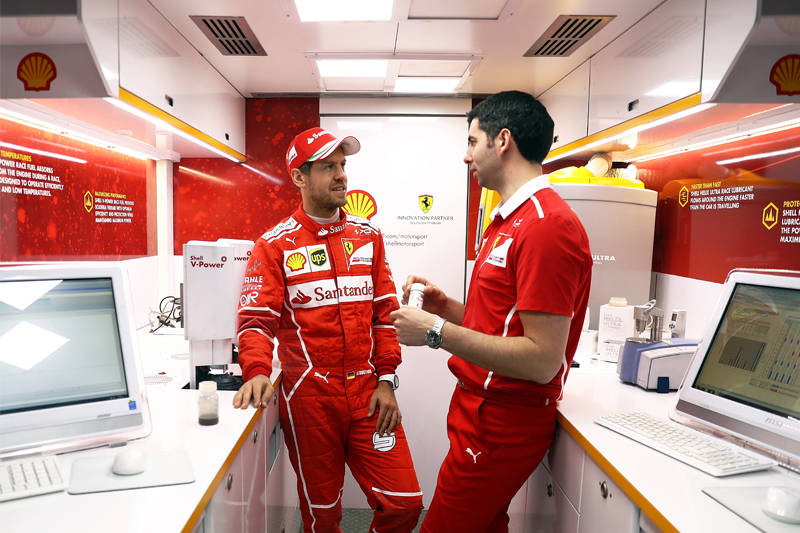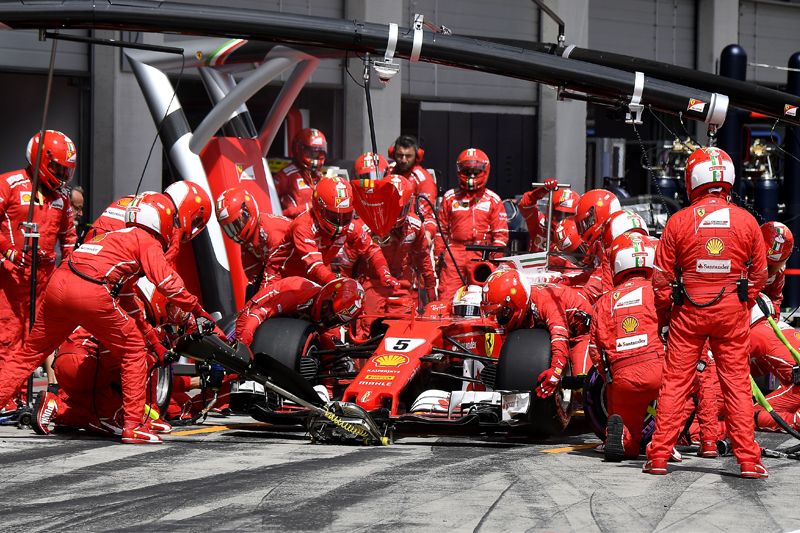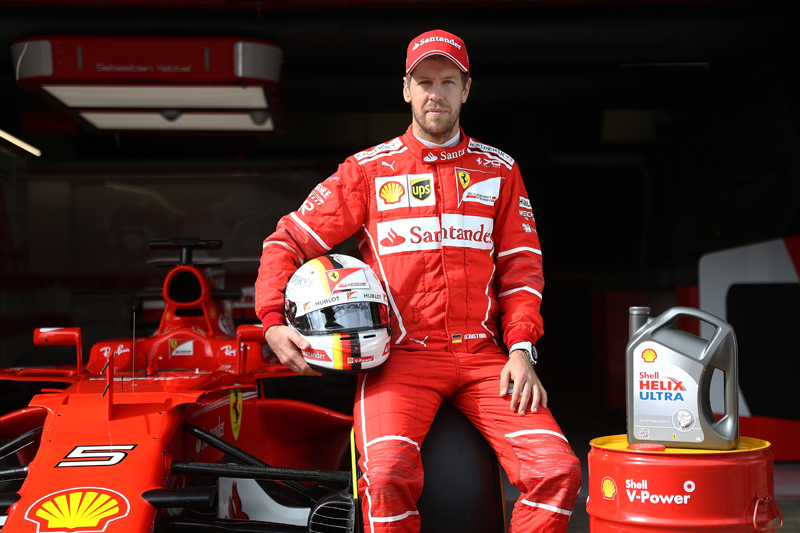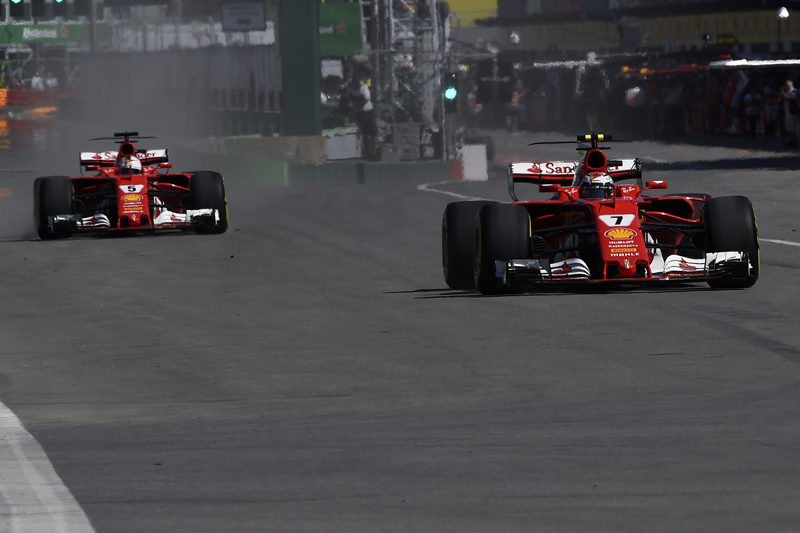PMM talks to Shell’s Motorsport Innovation Manager, Guy Lovett, and four-time Formula 1 World Champion, Sebastian Vettel, to explore Shell oil development on the Scuderia Ferrari Formula 1 team and why it could be the right choice for your garage.
Since 1947, when the first Ferrari road car rolled out the gates of Maranello filled with Shell fuels and lubricants, every vehicle produced in the famed factory has been powered and protected by Shell.
Over recent years, oil and lubrication development has become increasingly complex to match and exceed the expectations of ever evolving engine technology. With the influx of numerous new oil formulations, many workshops will be feeling the pressure when it comes to choosing the correct oil to stock and use.
We caught up with Guy Lovett of Shell and Sebastian Vettel of the Scuderia Ferrari Formula 1 team, to find out more about Shell oil development in the most extreme conditions and why Shell Helix could well be the answer you’ve been looking for.
PMM: Why is Shell Helix the best choice for independent workshops?
Guy Lovett (GL): There is no other oil on the market that has been designed and developed in partnership with the most successful Formula 1 team in existence. The technology that we develop and innovate with Ferrari and Formula 1 is at the cutting edge of automotive technology. Having the most advanced engine creates an ideal testing platform for us operating in the most extreme conditions imaginable. This gives us a unique opportunity to trial and develop our latest, most advanced synthetic oil formulations. Through those insights and from that testing platform, we can collect a huge amount of information about how our oil is performing under those conditions, the technology of which we can then transfer to our road going products.
While there is no hiding that the formulations between a racing car and passenger car are different – in Formula 1 we can fine tune the oil for one specific engine which is a lot easier than doing the same thing for a multitude of engine types and technologies in the market – workshops can have peace of mind that our scientists have spent decades using Scuderia Ferrari’s Formula 1 cars as the ultimate test bed to develop the Shell Helix oil range that will improve and boost their customer’s engine performance

PMM: How does Shell meet the increasing demands of the modern passenger car in light of its work with Formula 1 racing?
GL: There are many similarities between a Formula 1 car/engine to a road going car/engine than meets the eye. For us to be able to trial, develop and optimize our oils in a Formula 1 car, means that all of that technology and innovation is completely relevant to downsized, turbocharged, direct injected road car engines.
PMM: How has Shell’s relationship with Scuderia Ferrari and Formula 1 helped to raise awareness to the importance of using premium motor oil in the independent automotive aftermarket?
GL: The best thing we can do is lead by example. We help generate competitive advantage for Ferrari to put them at the forefront of the grid and through the success in our partnership in Formula 1 that essentially establishes a fantastic marketing platform for us to demonstrate our technology and leadership in synthetic motor oils.
During our 2015 season, we really had a break through with our performance, as did Ferrari, and a quarter of that performance gain that Ferrari had during the 2015 season was down to our fuels and lubricants. If you stack that up through the evolution of our products, that sums up to about half a second in lap time advantage which in Formula 1 terms is massively significant.

PMM: How is Shell, through its partnership with Ferrari, searching for more ways to bring pioneering technology to motor oil formulations?
GL: The margins we work to on the Ferrari Formula 1 team are incredibly thin. We have over 50 technical staff involved in supporting the Formula 1 programme. We are able to trial the latest synthetic base oil technology under the most punishing conditions, in engines that can run in excess of 1,000 degrees Celsius.
During a Formula 1 season, each driver only gets four engines and if one is lost, the remainig three have to stretch even further. The durability aspect has become a major component in a race. We don’t just look at instantaneous performance gain to an oil evolution, we are looking at performance longevity. It’s inevitable that over a life time of an engine, performance will change a little bit as it ages and what we want to try and do is minimise that and maintain performance for as long as possible – that’s why we have developed an oil range that provides protection against sludge, lower viscosity for better fuel economy and exceptional temperature performance, which ultimately ensures longer engine life.
The amount of knowledge, understanding and insight we get through optimizing that process is invaluable to us and our wider Shell Helix optimization for consumers.
PMM: How critical is the role of oil companies to the evolution of the automotive world?
GL: We have an obligation as an energy company to play an active role in the future of mobility. It’s clear that the internal combustion engine will be here for a little while still, and we therefore have an important part to play in making the internal combustion engine as efficient as possible whether that be through advanced material coatings, surface technology, lubrication science, combustion systems or taking it out in to hybrid systems and e-mobility. We’ve seen in Formula 1 the inception of the hybrid turbo charged power units, which are very complex systems that go beyond just an engine. To have the ability to see that and how our products work in that system puts us in a very advantageous position. We have an active role towards optimizing efficiency – for road cars, it’s an oil that provides enhanced cleansing and engine protection, resulting in greater efficiency. It’s a very, very complex technology change.

PMM: What’s the role of Shell Helix oil in a Formula 1 Championship and how does it affect your performance on the track?
Sebastian Vettel (SV): In general it’s to protect our engines and it’s as simple as that. Nowadays, our engines are quite complex, quite difficult to manage and it’s very tricky on the one hand to extract maximum performance and on the other hand to maintain engine longevity. As a driver, once you turn it up, you don’t ever want to turn it down and that’s where Shell help us with fuel and oil to give us performance and protect the engine.
PMM: How much of a competitive edge can you attribute to the use of specific oils in Formula 1?
SV: Every little bit matters at the end of the day. You need to put the puzzle together and obviously Shell is a key technical partner. There is a lot of science behind it. If we have an update for an engine, it’s hand in hand with Shell trying to maximize performance. It’s different to maybe ten or twenty years ago where one side did their bit and the other side did theirs, it now has to be a combined effort. That’s why the technical partnership for us is very important.

PMM: What’s the importance of the role of lubrication to a racing driver in comparison to your everyday motorist?
SV: Maybe you can compare up to the point when you have a problem. Obviously we have staff from Shell running around our car helping and supporting us, but as a driver, it’s not the component you spend the most time with in terms of trying to make the car go faster on the spot.
It’s something working in the background, but as a driver you directly benefit. As I said, in your day-to-day racing you care about how the car feels and handles and normally as a driver we are quite spoiled. We just want the engine to run with the most power. In that regard its similar to the everyday motorist.
Our engines are pushed to the full extreme, we are not cruising or just driving to get to the finish line, we drive to get there as quickly as possible. It’s really down to the details in performance and reliability, whilst making sure you consume as little as possible. The way you store the oil, where the oil tin sits, where it lives, how hot it needs to get, how hot it shouldn’t get, it all makes a difference.
It’s sometimes good not to know how much work there is behind the scenes as you want to be focused on driving as fast as possible.
PMM: How have Shell lubricants developed over the time you have spent with Ferrari?
SV: Yeah, obviously my time has only been over the last two and a half, close to three years, but looking from, lets say, what I knew before to what I know now is a massive step up. How involved Shell is as a technical partner is crucial. They don’t just supply the oil, they take samples to help protect the engines.
The methods we have these days allow us to see or feel for potential failures far before they actually become a problem and the team can take action to prevent this. We have prevented many failures due to this. It’s impressive to see the efforts behind the scenes because on the day, you can feel the difference.
You know, when you think about it, the oil is mainly to run the engine, protect the gearbox, protect the engine but it also gives you performance. The less friction you have again translates. Working against such small margins, we have to squeeze everything out. Surprisingly, I have to say, with new upgraded oil and fuel, I could literally feel the difference. It’s been good.










